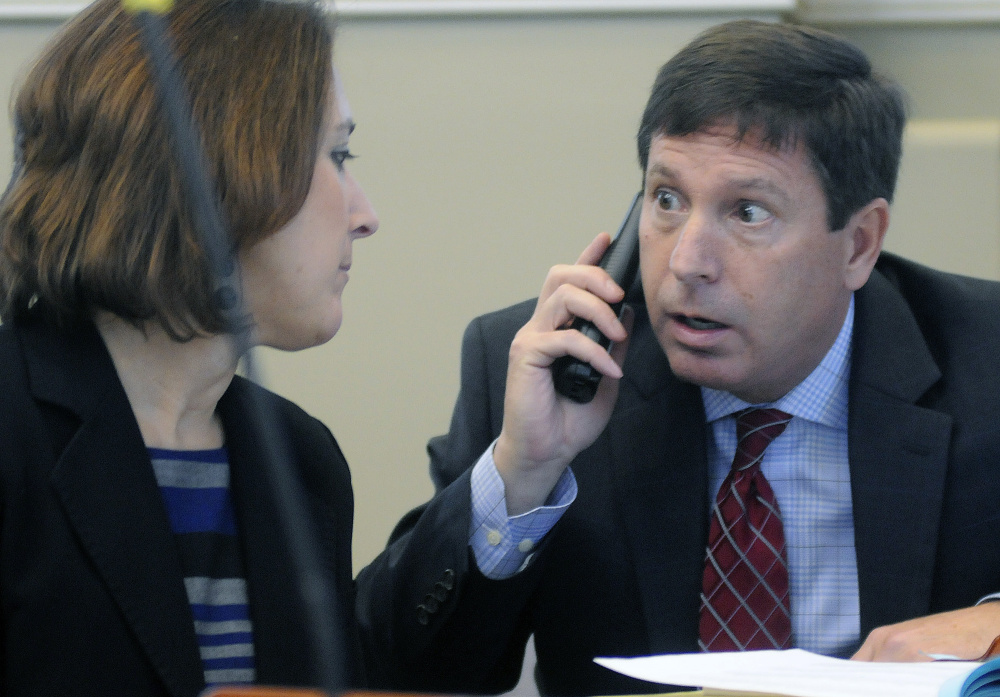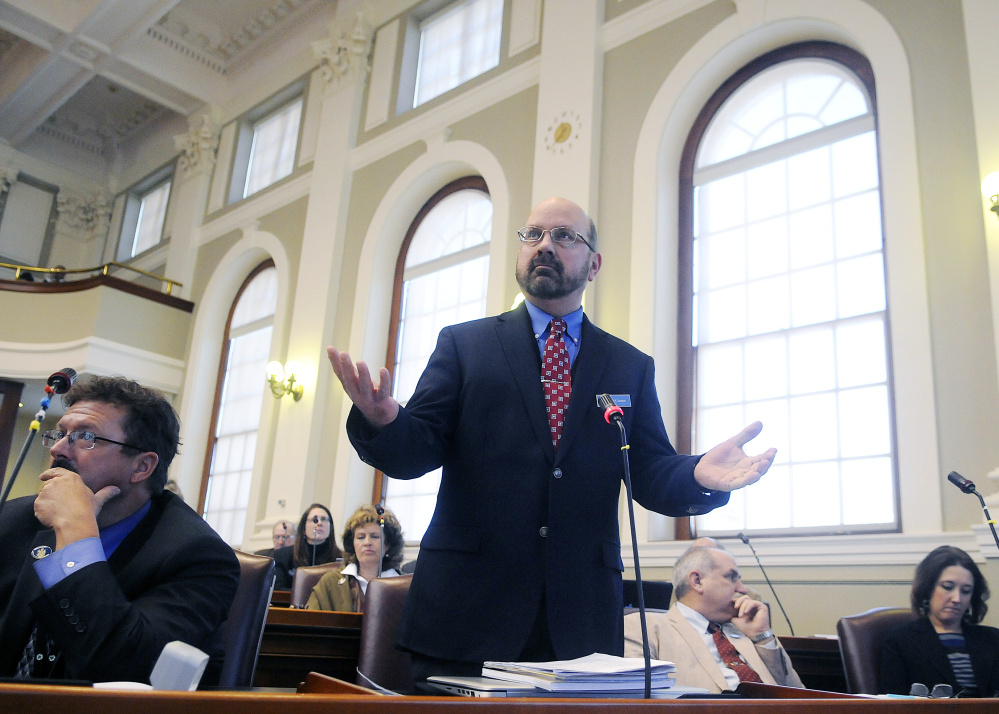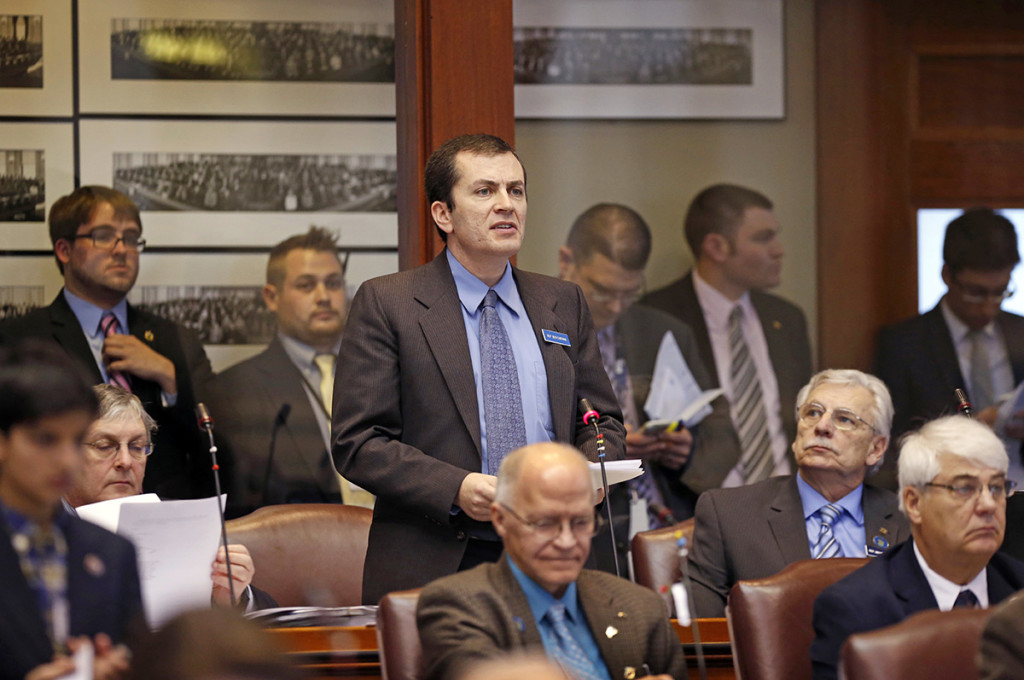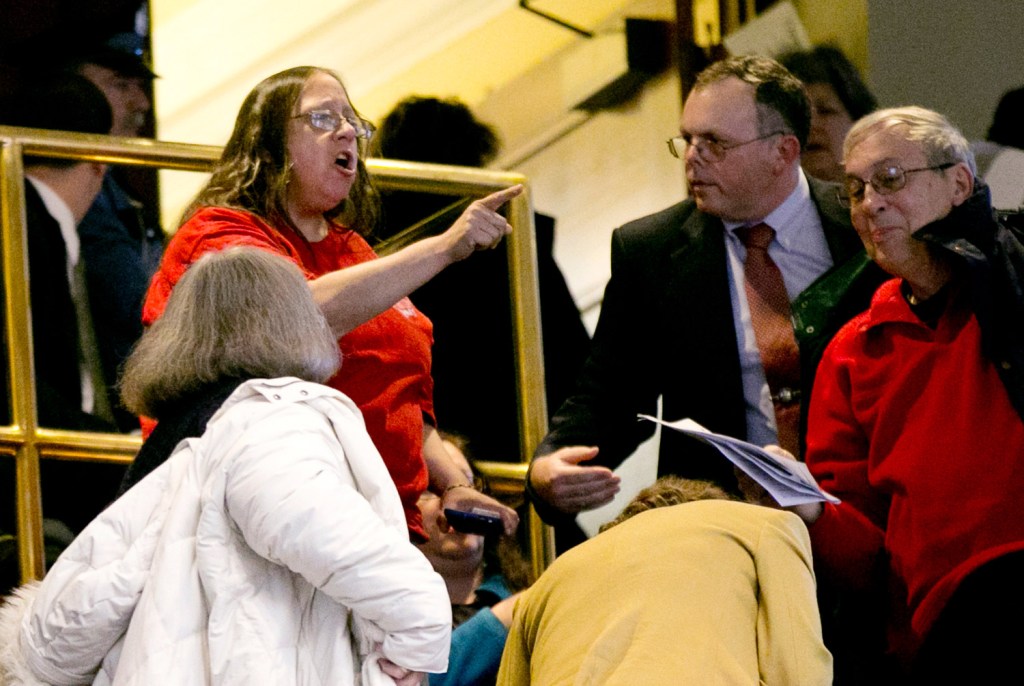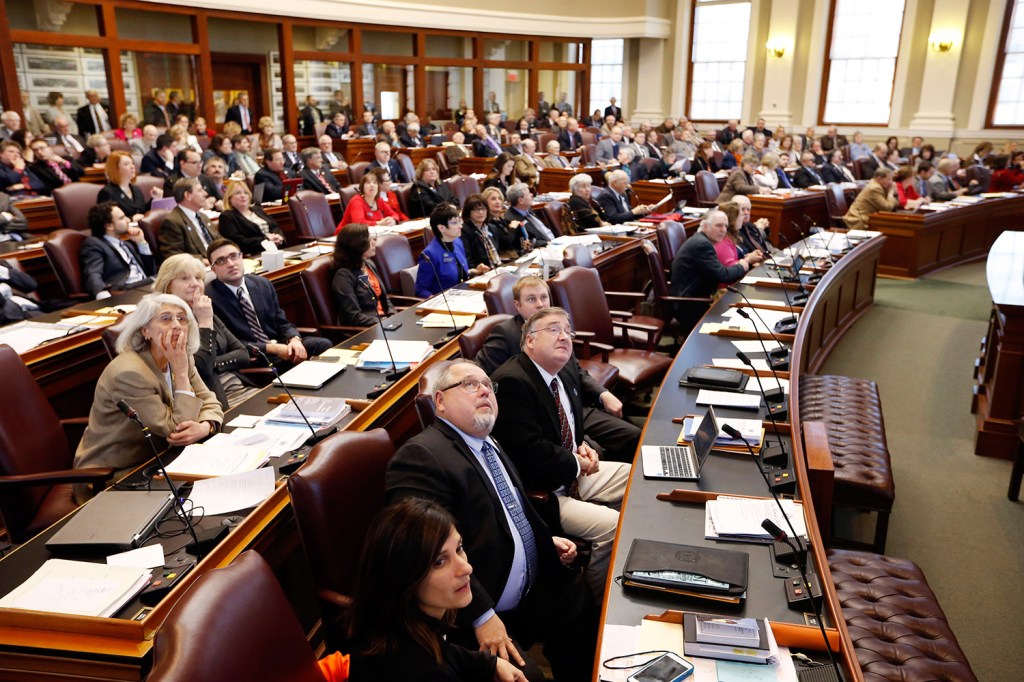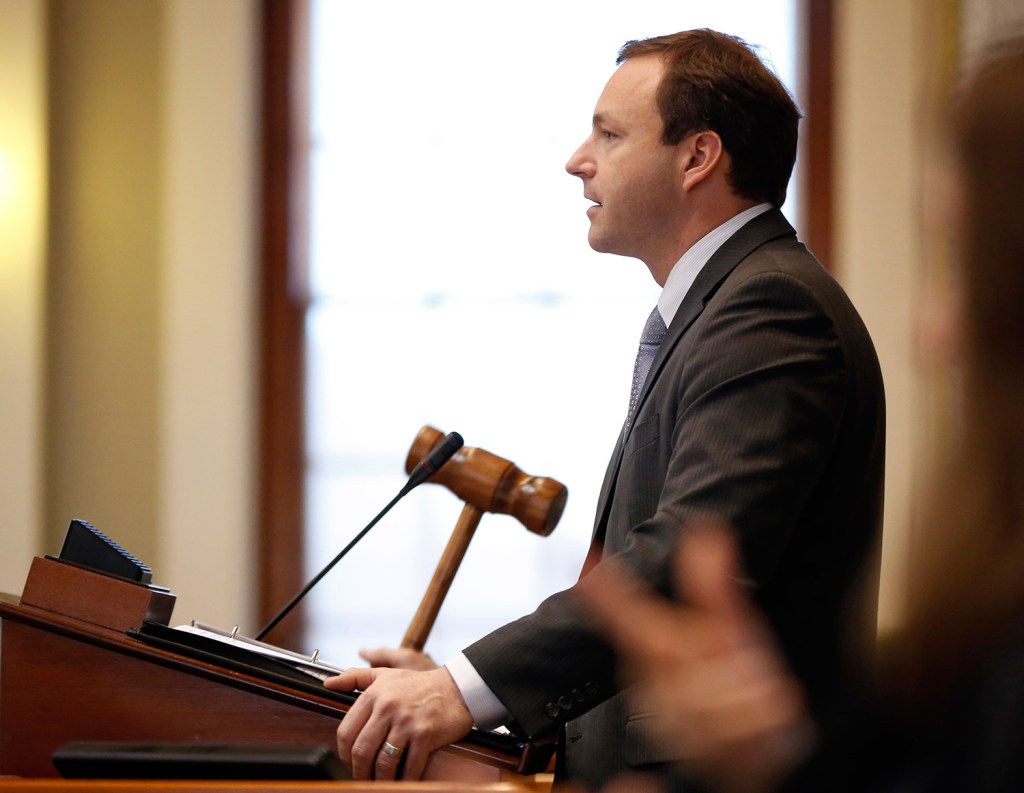AUGUSTA — Democrats who control the Maine House of Representatives balked Thursday at the opportunity to investigate and potentially impeach Republican Gov. Paul LePage on charges that included intimidation.
Instead, the House passed a vaguely worded resolution that praises cooperation and civil behavior but doesn’t mention LePage.
The 96-52 vote not to pursue impeachment reflected divisions within the majority party. Numerous Democrats joined the Republican minority to defeat the impeachment investigation – a decision that drew shouts of protest from the House gallery.
“Dereliction of duty!” one woman yelled, as she was escorted out of the chamber by Capitol security. “LePage is a fascist! Do your job!”
Of the 76 Democrats who voted Thursday, 27 supported the motion to kill the impeachment effort and 49, including members of leadership, voted to allow further debate.
Republicans voted unanimously against the impeachment order and also opposed the separate resolution praising bipartisanship and cooperation, which passed 81-55.
The resolution, which largely mirrors the Legislature’s code of ethics, extols the virtues of statesmanship and working together for the common good. Nowhere does it name LePage, with the closest reference coming in oblique language – such as a passage asserting that “the negative conduct and harmful actions of one do not represent the whole of Maine.”
LePage issued a statement after the votes Thursday, saying “this impeachment nonsense was nothing more than a political witch hunt that had absolutely no merit. While some members of the Legislature were obsessing for months over this foolishness, I have been working on the real issues that matter to the Maine people.”
Assistant House Democratic Leader Sara Gideon of Freeport said in an interview after the votes that Democrats decided against censuring the governor, but she did not explain why. She said future punishment largely depended on LePage.
“It’s really up to the governor to behave in a way that’s befitting of the chief executive of this state,” she said.
Democratic House Majority Leader Jeff McCabe of Skowhegan was asked if he thought that legislators had held LePage accountable.
“Did we hold the governor accountable? No,” McCabe said. “Do we want to move forward with other pieces of legislation that will hold him accountable? Absolutely.”
In a written statement, the Maine Republican Party condemned the “sanctimonious, self-righteous shift” of Democratic leaders.
“How strange, to see the Democratic caucus, which has been launching vicious political attacks for years, suddenly decide it is time to symbolically vote for civility,” said Jason Savage, the party’s executive director.
ELECTION CONCERNS INFLUENCED VOTE
The fitful floor debate over impeachment took place over several hours. It was marked by McCabe repeatedly warning legislators to distinguish between allegations and statements of fact. Democrats alleged that LePage abused his power on multiple occasions. Republicans characterized the proceeding as a partisan effort designed to reverse the results of the 2014 election.
Some Democrats said they reluctantly supported the impeachment investigation. Rep. Gay Grant, D-Gardiner, said, “This is not the kind of history I came to Augusta to make,” but the allegations in the order outlined a pattern of “tactics not only anathema to our government … but (that) may even threaten the balance of power enshrined in our constitution.”
Republicans focused on the controversy that gave rise to the impeachment drive: the governor’s threat to withhold funding from Good Will-Hinckley, a private school in Fairfield, unless it rescinded its job offer to make Democratic House Speaker Mark Eves its next president. LePage and some Republicans have asserted that Eves’ hiring was politically influenced.
“I believe the governor deserves not an impeachment order, but a public service award for blowing the whistle on what happened,” said Rep. Lawrence Lockman, R-Amherst.
The resolution vote, endorsed by Democratic leadership, illustrated the political reality that LePage would not be convicted in the Republican-controlled Senate of impeachment charges, an unprecedented act in Maine. It also reflects concerns among Democrats that some of their members in competitive districts could face electoral consequences in November for voting to punish the governor.
In December, Attorney General Janet Mills, a Democrat, said no evidence had been found that warranted a criminal investigation into LePage’s actions in the Good Will-Hinckley affair, weakening support for the impeachment effort. Before the cameras arrived Thursday, some Democrats expressed frustration that party leaders had not been more aggressive.
Rep. Peter Stuckey, D-Portland, said in a caucus before the floor debate that he was disappointed that Democrats had accepted a “kumbaya” gesture over a principled stance against LePage. He said the House resolution seemed to be more about the next election.
Gideon vaguely referenced the governor’s actions in the Good Will-Hinckley affair during her floor speech.
“Democracy itself means that everyone in this country can participate without fear of retribution,” she said.
Democrats had hoped that Republicans would support the House resolution on bipartisanship, but it passed largely along party lines, 81-55. The House has 78 Democrats, 69 Republicans, three independents and one unenrolled member.
ACCOUNTABILITY, OR PARTISAN ACTION?
The historic impeachment proceeding had been discussed at length in advance by Democratic and Republican leaders. Both sides agreed to a debate framework, designing it to allow impeachment proponents and opponents to have their say on the floor without igniting a messy debate that could taint and prolong the legislative session.
Ben Chipman, who supported an impeachment investigation, said he wished LePage didn’t engage in a variety of actions that in his mind constituted an abuse of power. The impeachment order contained eight allegations, including the Good Will-Hinckley matter, forcing out the president of the Maine Community College System, and withholding bonds for the Land for Maine’s Future program.
“I wish none of these things happened … but the chief executive has put us in this position,” Chipman said.
Rep. Jeffrey Evangelos, an independent from Friendship, was dissatisfied.
“Clearly there were no winners today, but there was one loser, and that’s the image of our great state and our people,” he said.
Eves, who recused himself from the impeachment vote and is suing the governor in federal court, said it was “a sad day and a sad chapter in our state’s history” that lawmakers felt compelled to propose the impeachment order.
“The governor has created an environment where legislators do have to look over their shoulders and fear retribution,” he said.
During the floor debate, Democrats said the governor had established a pattern of behavior that compelled legislators to act.
Rep. Chris Babbidge, D-Kennebunk, said, “It is appropriate that if the most powerful political leader in the state abuses his power … that such actions won’t be tolerated. If we don’t use the tools afforded to this body, I fear that we may regret it.”
Republicans were mostly quiet during the debate. At times, nearly half of the Republican seats in the chamber were empty as Democrats painstakingly enumerated details of the governor’s actions.
Rep. David Sawicki, R-Auburn, described the impeachment order as an inherently “partisan” action. Republican leader Rep. Kenneth Fredette, of Newport, rose frequently to protest allegations that some Democratic legislators presented as fact, producing numerous interruptions in the debate.
Nationally, there have been 17 impeachment proceedings against governors and eight convictions, according to the Council of State Governments. No Maine governor has ever been impeached.
Despite the unlikely prospects for an impeachment conviction, the proceedings have affected LePage. Last week he asserted that some Senate Republicans and Democrats in the House were conspiring against him. On Tuesday, he told a Bangor radio station that he will likely break with custom and skip his State of the State speech to the Legislature and instead send a letter.
“Why am I going to go up and face people and talk to them in an audience that just a week or two before, they’re trying to impeach me? That’s just silliness,” he said. “So why don’t we just, I’ll go to work, keep working, I’ll send them a letter and call it a day.”
Staff Writer Steve Mistler can be contacted at 620-7016 or at:
Twitter: @stevemistler
Send questions/comments to the editors.

